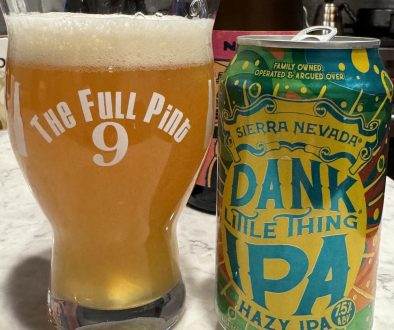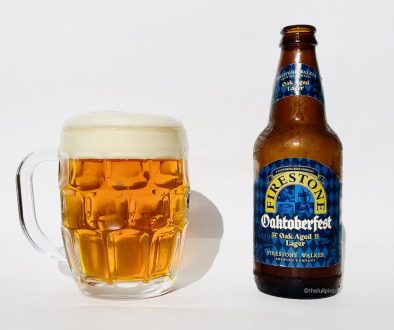Reviewed: Bell’s Special Double Cream Stout
Product description: Named for its velvety smooth, creamy texture, this incredibly rich stout is brewed with 10 different specialty roasted malts chosen that impart notes of rich mocha and espresso. Dark and sweet tones intermingle with a soft, roasty finish.
Bell’s Brewery – Bell’s Special Double Cream Stout – 12 oz. bottle poured into a chalice – 6.1% abv.
Bell’s lineup had a relatively recent brand refresh with regards to their packaging and graphic design. Special Double Cream Stout had a complete overhaul, though, with an all-new label design of a spiral of barley on a brown background as opposed to the previous label of a leafless tree branch on a light tan background. I like the old design better, which a had a surreal winter feel that hinted that this is one of Bell’s special winter releases. But the new design does give this a better look for a stout or porter type of beer, which may help your casual consumer.
I sampled this from a 12 oz, store-bought bottle with packaging date 8/8/2017. Again, Bell’s is the best in the industry for giving us this vital information on the beer. But Bell’s is the worst in the industry when it comes to recipes, of which they share essentially nothing. That leaves me and others guessing when drinking their beers, “How did they do that?” It’s a fun game unless you are lactose intolerant. The label does say it is made with 10 different specialty roasted malts. Dig deeper and a video on the Bell’s website mentions this beer uses chocolate malt, caramel malt, black malt, and Munich malt. The brewer in the video clarifies that Bell’s Special Double Cream Stout “does not have cream in it” but has a “creamy nature to it” from the “full malt character.” I find that misleading. Because if we assume that cream stout and sweet stout are synonymous with milk stout, then I’m willing to bet many buyers will think this has lactose. And both “cream stout” and “sweet stout” are featured on this beer’s label.
Into the glass, a normal pour generates outrageously large foam with very impressive head retention. There’s a beautiful reverse cascade of bubbles that builds the head from the bottom up. Getting to the end of the pour, I found there is a good amount of yeast sediment at the bottom of the bottle. In a small taster glass, I tested it out. If you dump in the sediment, it adds a chalky Marmite flavor to the beer that I would pass on.
In the aroma, Special Double Cream Stout starts off with black olive and tootsie roll, but I opened this bottle way too cold. I should have set it on the counter to warm up for 30 minutes prior like I usually do for dark beers. The aroma continues to skew more savory than I expected with cinnamon, black pepper, black olive, and saltwater taking over. At least for the first 30 minutes of this beer aerating and reaching room temperature, black olive dominates the nose. It certainly doesn’t strike me as cream stout from the aroma. I asked for a second opinion, and my wife described it as A&W root beer candies.
The flavor is super bitter up front – a lot more bitterness than I would expect from a sweet stout. The body is also super thin for this style. Alcohol is negligible and feels like 5% ABV. I checked the label again and it is only listed at 6.1%. So much for being a double stout. Again, there is nothing here to make me think lactose is added in. I did some internet sleuthing and it seems like the consensus for us plebeians is that this beer does not have lactose.
That bitterness I mentioned, it doesn’t seem too hop-derived. I think the hefty amount of roasted malts and probable addition of roasted unmalted grains in the recipe give this beer an earthy bitterness like burnt toast or pumpernickel bread. Couple this with the thin body and hardly any sugar, and that malt-derived bitterness and moderate hop content translate to high apparent bitterness on the palate.
It’s already very good, but this beer gets even better as it warms. At room temperature, it’s just perfect. That black olive obsession has finally dissipated and what you have left is essentially the cleanest, simplest beer I can imagine that focuses on roasted malt. There’s essentially no presence of yeast, alcohol, sugar, or hops here. It could be cold brew decaf coffee for all I know. You are also rewarded with this amazing nose of amaretto and Godiva liquor. But it’s fairly subtle and well-integrated – you really have to dig deep. Now, at least 60 minutes into this beer, you get this reward. So, my recommendation is to open the bottle at 60° F or room temperature and let it aerate for a good 30 minutes before finishing the whole beer.
Overall, I love this beer. It is a great educational beer given its simplicity. You can really focus on what roasted malt does in a beer without any distractions. And the big plus here is you get all that roasted character we love from stout/porter without any distracting sugar or high alcohol. However, my biggest qualm about this beer is the naming and the style attribution, which I personally think is misleading. This is not a sweet stout, it’s not a cream stout (a synonym for milk stout as far as I know), and it is certainly not a double stout. It’s my personal opinion that this doesn’t contain lactose, and that’s a big deal for your lactose-intolerant consumer. It’s also a big deal for your casual beer consumer. I, for one, dislike milk stouts in general. That lactose character typically adds tootsie roll flavors and sticky sweetness that I could do without. So, I almost always pass on milk stouts. But here I am enjoying the hell out of this. They just need to rename it to Bell’s Special Winter Stout.




